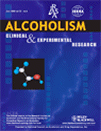 Alcohol, Cocaine, and Brain Stimulation-Reward in C57Bl6/J and DBA2/J Mice
Alcohol, Cocaine, and Brain Stimulation-Reward in C57Bl6/J and DBA2/J MiceAlcoholism: Clinical and Experimental Research Early View 23 Oct 2009
Pleasure and reward are critical features of alcohol drinking that are difficult to measure in animal studies. Intracranial self-stimulation (ICSS) is a behavioral method for studying the effects of drugs directly on the neural circuitry that underlies brain reward.
These experiments had 2 objectives: first, to establish the effects of alcohol on ICSS responding in the C57Bl6/J (C57) and DBA2/J (DBA) mouse strains; and second, to compare these effects to those of the psychostimulant cocaine.
C57 and DBA mice, reductions in BSR threshold reflect the ability of alcohol to potentiate the neural mechanisms of brain reward. The DBA mice are more sensitive to the reward-potentiating effects of both alcohol and cocaine, suggesting that there are mouse strain differences in the neural mechanisms of brain reward that can be measured with the ICSS technique.
Read Full Abstract
Request Reprint E-Mail fishe@neurology.unc.edu
__________________________________________________________________